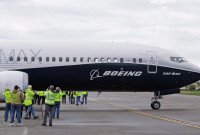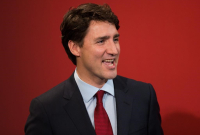Support strong Canadian climate journalism for 2025
The U.S. State Department has told Congress that it doesn't have any concerns about the possible sale of 18 Super Hornet fighter jets to Canada, which it estimates will cost around US$5.23 billion.
The price tag includes weapons, spare parts, training, software and other costs associated with putting the jets into service, but not upgrades to hangars or long-term support and maintenance.
The figure, which works out to around CAD$6.37 billion at current exchange rates, is contained in a formal notification to Congress published Tuesday.
Such notifications are legally required before the U.S. can sell military gear to another country. Congress now has 15 days to review the potential deal and if no objections are raised, it is considered approved.
But even if Congress doesn't object, there are no guarantees the Trudeau government will buy the Super Hornets, which the Liberals said last year were needed to shore up Canada's aging CF-18 fleet.
Defence Minister Harjit Sajjan's office said the Liberals won't decide whether to buy the jets until later in the fall, when it receives a formal proposal from the U.S. government.
"At that time we will be better positioned to assess how we can best meet the Royal Canadian Air Force's needs," spokeswoman Jordan Owens said in an email.
But the Liberals have also linked the deal to a bitter trade dispute between Boeing Co., which makes the Super Hornets, and Montreal-based Bombardier.
The State Department notification said selling Super Hornets to Canada could help the U.S. by helping "a NATO ally which has been, and continues to be, a key democratic partner ... in ensuring peace and security."
It would also "improve Canada's capability to meet current and future warfare threats and provide greater security for its critical infrastructure," the notification added.
U.S. officials did not expect the Canadian military would have any problems operating the Super Hornets alongside Canada's older CF-18s, or that the sale would "alter the basic military balance in the region."
The Liberals said last November they would purchase 18 "interim" Super Hornets to fill a critical shortage of fighter jets until a full competition to replace Canada's entire CF-18 fleet could be run starting in 2019.
The government said at the time that the Super Hornet was the only aircraft able to meet its immediate requirements, which include a mature design that's compatible with U.S. fighters.
But that was before Boeing complained to the US Commerce Department that Bombardier was selling its CSeries jet liners at an unfair price with assistance from federal government subsidies.
American authorities are currently investigating the complaint and are expected to present their preliminary findings on Sept. 25, which could lead to fines or tariffs against Bombardier.
The Liberal government has cut off contact with Boeing and threatened to walk away from the fighter purchase if Boeing doesn't drop the case.
It has also started looking at alternatives to Super Hornets, including the possibility of buying used F/A-18s from Australia. The F/A-18 is basically the same aircraft as Canada's existing CF-18s.
Boeing has shown no signs of reconsidering in spite of the threat and added pressure from the British government to drop the case and reach a negotiated settlement with Bombardier.
It says the case is vital to its long-term prosperity.





Comments